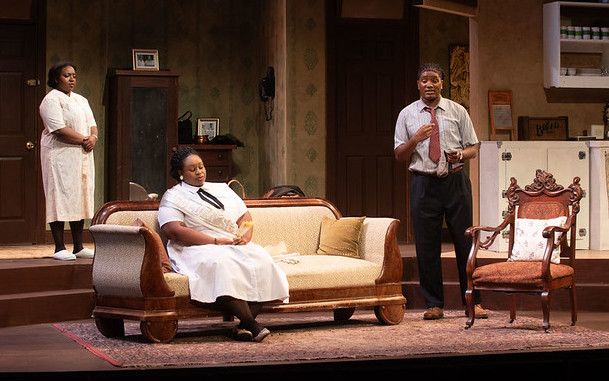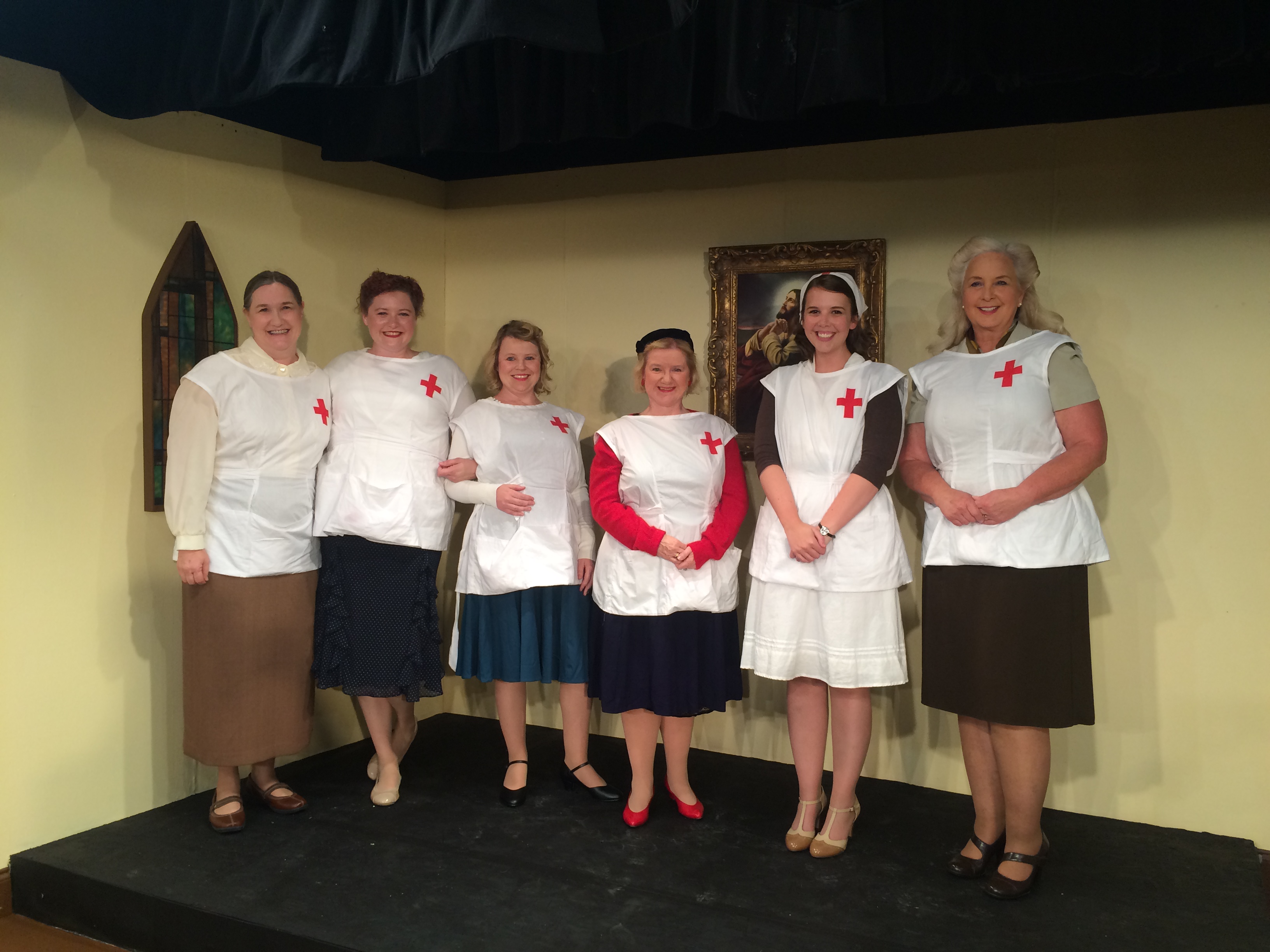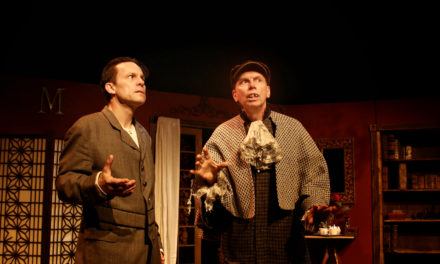Nyazia Brittany Martin, Candace Spencer, & Darrin Mosley Jr. in The Old Settler. Photo: Tom Fougerousse
The Old Settler
By John Henry Redwood
Directed by Catron Booker
A review by Tory Parker
Entire contents are copyright © 2023 by Tory Parker. All rights reserved.
It’s not often we get to be really swallowed into the world of theatrical realism anymore—it’s simply not the trend. Minimalist, “stripped-down” sets are all the rage in bigger budget theaters, and Bretchian elements of fourth-wall shattering or audience awareness fade in and out of style in different ways. The Old Settler feels like a period piece within a period piece in that way. The beautiful set is hyper realistic, no detail left untouched, as are the dialogue and the costumes; there is nothing intentionally anachronistic. We are IN Bess’ Harlem apartment in the middle of WWII, and these two women are sisters and this young, beautiful man in their house would never do anything to harm them. That’s the way things look so it must be the way things are, right?
Not so much. Over the course of the play we find that these sisters, Bess (Nyazia Brittany Martin) and Quilly (Candace Spencer) might live together, but there is very little they share otherwise. The addition of a roomer, Husband (Darrin Mosley Jr.), leads to chaos when his sweet naivety brings well-intentioned chaos in the form of Lou Bessie aka Charmaine (Krystal Waller). We also have a helpful, if painful, moment where Bess is referred to as an Old Settler, and it’s explained to Husband that is a term for a woman pushing 40 who has never been married and likely never will be.
All four performances are lovely. Martin, who had a righteously fun track at Kentucky Shakespeare this summer, shines in an entirely new way as the pushing-forty, no time or tolerance for bullshit-Bess. Bess is the kind of character who might be easily annoyed, but is rarely fussed. Her life has been hard, leaving her family and moving from the South to New York, taking care of her mother, learning how to forgive her sister, doing it all alone. The one person who knows exactly how to rile up Bess is Quilly, and you get the sense that Spencer and Martin relish this dynamic. They have a playful antagonism that all real sisters have, it feels lived-in, entirely without danger—until those very specific moments when it’s not.
Mosley’s Husband is easy to fall in love with, and you see exactly what someone like Bess would find to adore in a kind-hearted country boy trying to find his sweetheart in the big city. Mosley brings a puppy-dog sweetness that’s perfect for Husband—he’s entirely unaware of how much damage he can do without meaning harm. Unfortunately, we also see exactly what someone like Lou Bessie, made larger than life by Waller, might find in Husband, too. Lou Bessie, also known as Charmaine, is made into a cartoon villain in this story, though it sounds like she’s had a hard life of her own. Ultimately, the play doesn’t like that she’s slept with men she’s not married to or gone out with people whose social circles exist outside of the church, but it kind of disguises those barbs by making her biggest crime her callous treatment of Husband.
The production itself loses a little steam under some long scene transitions and a heavy, under-edited script. It’s a testament to these actors that whenever the play itself feels like it was running out of steam, they found the moments to bring us back along. It’s also a testament to their talent and professionalism that they were stoic and consistent in their performances in an audience full of their friends and classmates. When things happened in the play that threw us, we let them know.
It’s always a little confusing to me why universities casting from pools of young people choose works where the age dynamics of characters are central to the plot. Bess and Husband might be in love, but they can’t be together—because Bess is far older, and their lives are in far different places. That point can fall flat, even when all the performances are excellent, when the actors are very clearly all in the same generation. That being said, through these characters we get to explore the reality of 1940s Harlem, and the friction that arose amidst the Great Migration, as Black Americans moved from the sleepy isolated small farming towns of the South to the lively, crowded cities of the North. As Bess reminds Husband, just because it’s the North doesn’t mean it’s any less dangerous. The play captures such a specific moment—just after the Harlem Renaissance—the glory of the jazz age has faded, the danger of the war looms, and the drudge of everyday American white supremacy grinds down evermore. The moment feels tragically past its prime, full of dreams unfulfilled.
The show ends with dreams unfulfilled and hearts broken. Martin and Spencer have a brilliant, crushing moment as they share a song from their childhood on the couch. They end as they started, betrayed by men who promised to love them, the last of their family, hundreds of miles from a home that couldn’t love them as it should, but together.
Featuring Nyazia Brittany Martin, Candace Spencer, Darrin Mosley Jr, Krystal Waller.
The Old Settler
September 22 – October 1, 2023
African American Theatre Program
University of Louisville Department of Theatre Arts
The Playhouse
1911 S 3rd Street
Louisville, KY 40292
Tory Parker, originally from West Virginia, is now a proud Kentuckian as well. In Louisville, she’s worked and/or performed with Actors Theatre of Louisville, Claddagh Theatre Company, the Chamber Theatre, Bellarmine University, Wayward Actors Company, Derby City Playwrights, Company OutCast, SHOTZ, Highview Arts Center, and director Emily Grimany. She is a co-founding artist of the queer theatre collaborative, three witches shakespeare. As a playwright, her full length drama, Recommended for You, appears in Stage It and Stream It: Plays for Virtual Theatre, and her original works have appeared in the National Women’s Theatre Festival Fringe Festival.





